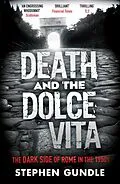"A brilliant, methodical investigation of a murder scandal that convulsed the Roman political and social establishment in the 1950s" ( Financial Times).
On April 9 1953, twenty-one-year-old Wilma Montesi went missing from her family home in Rome. Thirty-six hours later her body was found washed up on a neglected public beach. Some said it was suicide; others, a tragic accident. But as the police tried to close the case, darker rumors bubbled to the surface. Could it be that the mysterious death of this quiet, conservative girl was linked to a drug-fueled orgy, involving some of the richest and most powerful men in Italy?
Death and the Dolce Vita, "a hybrid of history and police detection, brilliantly recreates the details of the Montesi affair" in light of the postwar economic miracolo italiano that inspired Fellini's classic film of libertine frivolity. "As well as being a thriller, [it] provides an excellent account of the virtues and misdeeds of Europe's most foxy political class" (Ian Thompson, The Guardian, UK).
"An intense, claustrophobic narrative of murder, mystery and scandal worthy of a Verdi opera... a page-turning narrative that explores its extraordinary characters and even more extraordinary cover-ups, evasions and dissemblage, reaching to the top of Italian political life." - The Scotsman, UK
Autorentext
Stephen Gundle is an historian with specialist interest in modern Italy. His books include Bellissima: Feminine Beauty and the Idea of Italy and Glamour: A History. Professor of Film and Television Studies at the University of Warwick, he has also lived for many years in Italy, and is a contributor to History Today, Radio 4's Night Waves and the Italian press.
